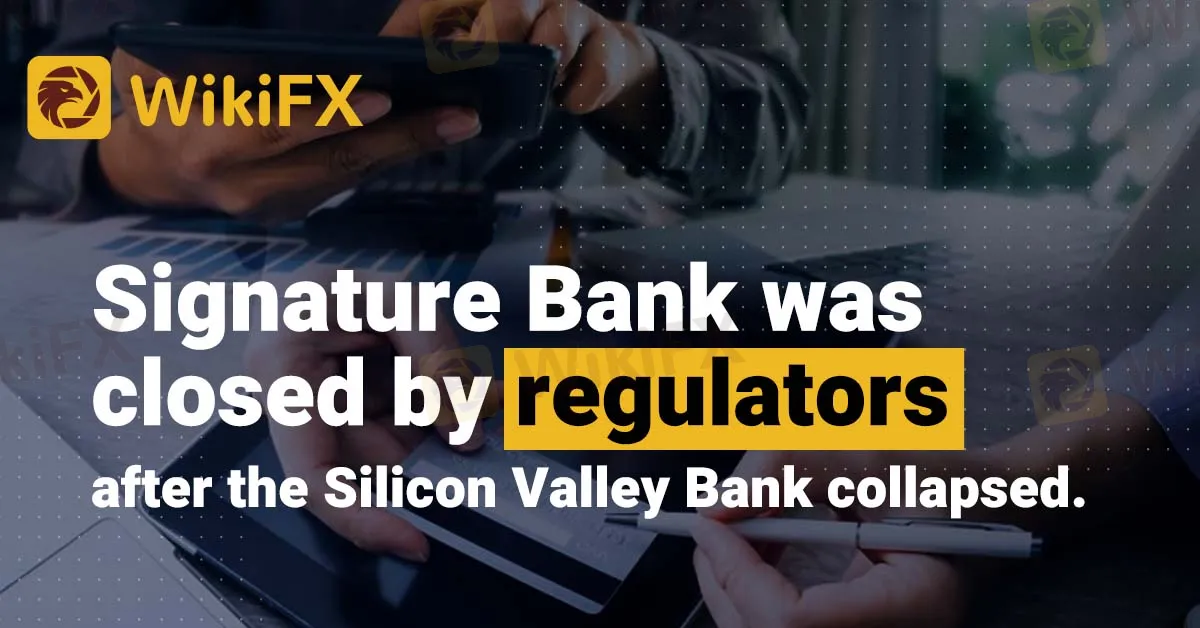简体中文
繁體中文
English
Pусский
日本語
ภาษาไทย
Tiếng Việt
Bahasa Indonesia
Español
हिन्दी
Filippiiniläinen
Français
Deutsch
Português
Türkçe
한국어
العربية
Signature Bank was closed by regulators after the Silicon Valley Bank collapsed.
Abstract:According to CNN, Silicon Valley Bank collapsed Friday morning after a stunning 48 hours in which a bank run and a capital crisis led to the second-largest failure of a financial institution in US history. After this, another bank, Signature Bank has been closed by regulators, which marks the third-biggest bank failure in U.S. history.

1. The fall of Signature Bank marks the third-biggest bank failure in U.S. history.
2. Federal Reserve announces that all depositors at Silicon Valley Bank will be protected and an auction is held for SVBs assets.
3. The closure of Signature Bank spelled trouble for the cryptocurrency industry.
Abstract:
According to CNN, Silicon Valley Bank collapsed Friday morning after a stunning 48 hours in which a bank run and a capital crisis led to the second-largest failure of a financial institution in US history. California regulators closed down the tech lender and put it under the control of the US Federal Deposit Insurance Corporation. After this, another bank, Signature Bank has been closed by regulators, which marks the third-biggest bank failure in U.S. history.
The Federal Deposit Insurance Cooperation (FDIC) on Sunday held an auction of Silicon Valley Bank's assets, hoping to secure the bank before the market opened on Monday.
The fall of Signature Bank marks the third-biggest bank failure in U.S. history.
Signature Bank,
Signature Bank, a New York-based financial institution. It had 38 private client offices throughout New York, Connecticut, California, and North Carolina. It was founded in 2001 for wealthy clients, with more than $250,000 in assets, and was closed by regulators on Monday after its parent company, Pacific Valley Bankshares, was unable to raise the capital needed to continue operations. The closure marks the latest casualty of the ongoing economic downturn, which has hit smaller banks particularly hard.
The collapse of Signature Bank was not unexpected, as the bank had been struggling for some time. In recent years, it had suffered from declining profits and mounting losses, and its loan portfolio had been hit hard by the recession. In addition, the bank had been heavily exposed to the troubled real estate market, which is still struggling to recover from the housing bubble.
Federal Reserve announces that all depositors at Silicon Valley Bank will be protected and an auction is held for SVBs assets.
The closure of Signature Bank comes on the heels of the collapse of Silicon Valley Bank, which was also shut down by regulators earlier this year. Both banks were seen as key players in the region's venture capital industry, which has been particularly hard-hit by the economic downturn. The Federal Deposit Insurance Cooperation (FDIC) on Sunday held an auction of Silicon Valley Bank's assets, hoping to secure the bank before the market opened on Monday.
According to industry experts, the failure of these banks highlights the risks inherent in the venture capital business. Unlike traditional banking, where loans are secured by collateral such as homes or cars, venture capital investments are typically riskier and more speculative. As a result, these investments are more vulnerable to economic downturns and other external factors.
The collapse of Signature Bank and Silicon Valley Bank is a wake-up call for the venture capital industry, which must now grapple with the fallout from these failures. Experts say that the industry must do more to educate investors about the risks involved in venture capital investing, and must work harder to ensure that these investments are properly diversified and managed.
The closure of Signature Bank spelled trouble for the cryptocurrency industry.
Despite these challenges, there are still many opportunities for investors in the venture capital industry. With the right strategy and expertise, investors can still make money in the tech sector, even in the midst of an economic downturn.
However, success in this field requires a willingness to take risks, a deep understanding of the market, and an ability to identify promising start-ups before they become household names. For those who are willing to take these risks and invest in the future of technology, the rewards can be substantial.

Disclaimer:
The views in this article only represent the author's personal views, and do not constitute investment advice on this platform. This platform does not guarantee the accuracy, completeness and timeliness of the information in the article, and will not be liable for any loss caused by the use of or reliance on the information in the article.
Read more

Oil Prices Continue to Rise Due to Sanctions
Last Friday, oil prices closed slightly lower but increased for the fourth consecutive week, mainly due to the impact of the latest U.S. sanctions on Russian energy trade, which heightened concerns about oil supply disruptions.

Will Gold Prices Continue to Rise Due to Trump’s Tariffs?
Recently, gold prices have been driven by rising U.S. government debt, persistent inflation, and growing economic uncertainty, showing strong performance.

SEC Fines Vanguard $106 Million Over Misleading TRF Tax Disclosures
The Securities and Exchange Commission (SEC) has imposed a hefty $106.41 million fine on Vanguard Group, Inc. following an investigation into misleading statements regarding the tax consequences of its Target Retirement Funds (TRFs).

Why the Federal Reserve Is So Important
The Federal Reserve, since its establishment in 1913, has transformed from a simple monetary stability institution into a core pillar of the U.S. economy. Its policies not only have a profound impact on the domestic economy but also deeply influence global financial markets.
WikiFX Broker
Latest News
Will Gold Prices Continue to Rise Due to Trump’s Tariffs?
Why the Federal Reserve Is So Important
Boerse Stuttgart Digital Secures EU-Wide MiCAR Crypto License
SEC Fines Vanguard $106 Million Over Misleading TRF Tax Disclosures
Swiss Population Strongly Opposes Abolition of Cash, Philoro Study Reveals
Oil Prices Continue to Rise Due to Sanctions
Currency Calculator






